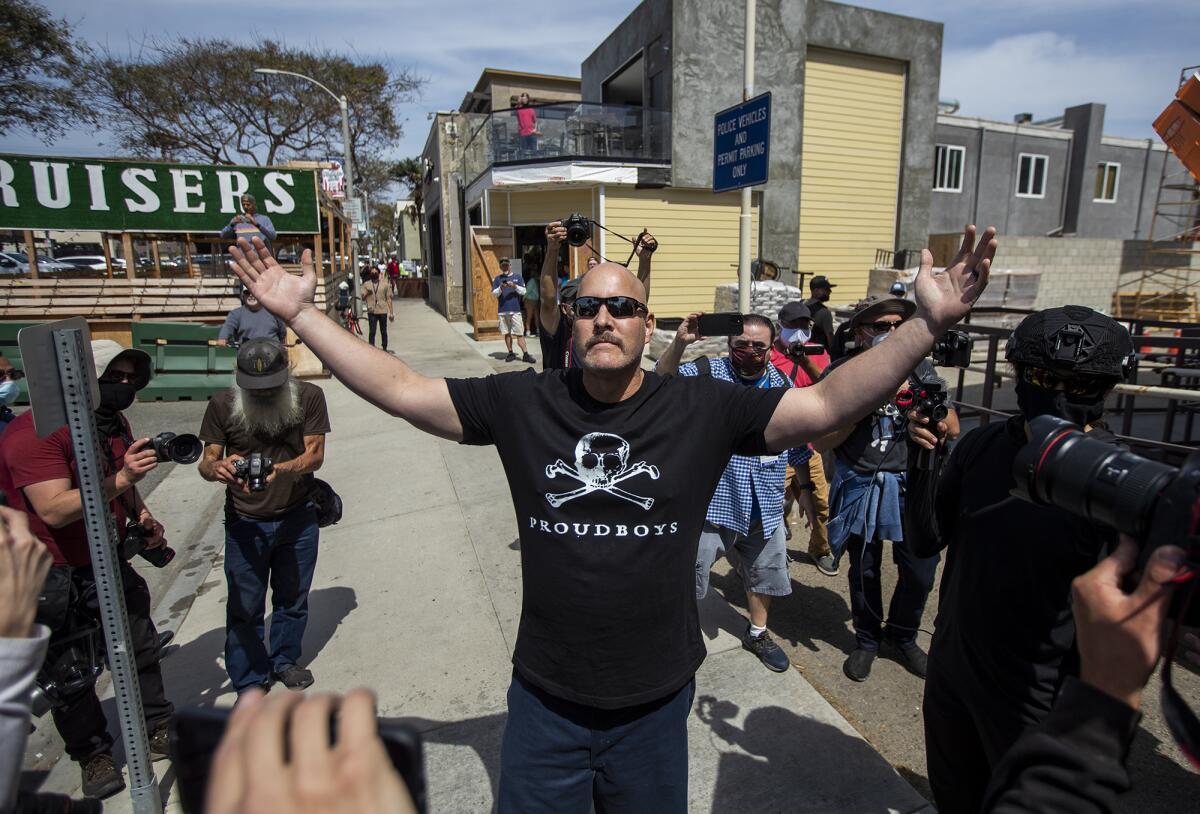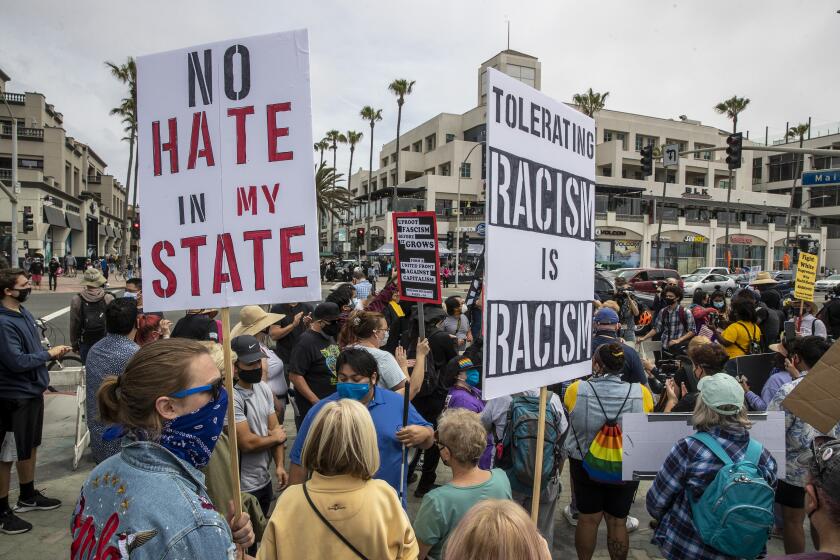Apodaca: 3 Orange County residents who fight against the spread of hate

- Share via
Pete Simi is an associate professor of sociology at Chapman University.
Peter Levi is a rabbi and regional director for the Anti-Defamation League.
Kim Carr is the mayor of Huntington Beach.
These three people are different in many respects. Yet they all felt from a young age a deep desire to work for causes that are bigger than themselves, a calling that would define the course of their lives and, hopefully, make the world just a little bit kinder, more tolerant and inclusive.
They are, each in their own way, going to battle against hate. It’s a daunting, uphill fight, one that has shown itself to be particularly challenging in recent times as we experience a steady increase in hate-related activity.
As Simi said, it sometimes feels as if the struggle against racism, anti-Semitism, anti-LGBTQ sentiment and other forms of bigotry amounts to “two steps forward and three steps back.”
Nonetheless, Simi remains committed to doing whatever he can to promote tolerance and understanding. And that’s a good thing, for if we’re ever going to move Orange County, and the nation at large, away from the most disreputable aspects of our history and from the plague of hatred that continues to infect hearts and minds, perseverance is required.
According to reports by agencies and organizations that track such data, the number of hate-related incidents has been on the rise.
Simi is a noted academic who has devoted his career to studying extremist groups and violence, his research taking him deep inside the psyches of white supremacists to explore their developmental influences and craft strategies to respond. His book, “American Swastika: Inside the White Power Movement’s Hidden Spaces of Hate,” cowritten with Robert Futrell, includes interviews with white supremacists and details how hate groups cultivate new members.
Hate is an insidious force that must be confronted, Simi said.
“We need to address it not as a fringe problem but as a problem of society. It didn’t just appear. These are people who are homegrown.”
Part of the problem, he said, is that we as society have indulged and excused an everyday type of racism that can act like a gateway drug to more poisonous outcomes. Such casual racism is sometimes introduced in the home through seemingly offhand remarks and intolerant attitudes.
Simi’s interview subjects were often raised in such an environment and then grew into angry adolescents and adults who felt compelled to take their prejudices to a more extreme level, saying that their “parents didn’t have the courage to take the next steps.”
Undoing such influences isn’t easy and must be approached in a multifaceted manner.
Such is the challenge undertaken by Levi, who as a rabbi and for the past five years as the ADL’s regional director, has long been drawn to and involved in social causes. Though the ADL is widely known for combating anti-Semitism, the organization is committed to defeating all forms of bigotry and to promoting fair treatment for everyone.
Anti-Semitism, Levi said, is often “the canary in the coal mine. When you see anti-Semitism, you see other intolerance.”
Changing that script, he said, requires ensuring that we have accessible means of reporting hate-related incidents and that law enforcement agencies have the resources and training needed to address hate crimes and homegrown terrorist threats. Securing accurate data is critical to making sound policy decisions about where to direct such resources, he noted.
Another piece of the effort involves calling on public officials to denounce unequivocally white supremacy and to strengthen hate crime laws and the enforcement of existing laws. And it falls on all of us to speak out against intolerance wherever we see it and in support of those who are targeted by hate groups.
The most important element in the fight against hate is education. As Simi observed, “this isn’t a problem we can arrest our way out of.”
It’s often said that people aren’t born with hate; they learn it. It stands to reason, then, that they can also be taught to love and accept others who are different from them and that bigotry can be unlearned. Anti-bias curriculum is key and must begin with the youngest students.
“No one is born a bigot,” said Levi. “Let’s disrupt that pattern.”
Mayor Carr probably doesn’t think of herself as a disrupter but she is trying to change the narrative for a city long known as a haven for white supremacists. She hopes to accomplish that not through confrontation but by promoting a welcoming, inclusive environment.
“One of the things I’ve learned over the past couple of years is to not call people out but call them in,” she said. “Rather than dwell on the past and negativity, really listen to the stories of people affected by hate and racism. Listen to their stories so that we can better understand how to make changes.”
A couple of examples of that effort are the recent vote by the Huntington Beach City Council to fly the LGBTQ pride flag at City Hall and a city-sponsored picnic at Central Park intended to promote cultural diversity.
“This is more powerful than some leaflets that were dropped off trying to recruit people for the KKK,” she said. “The way we’re going to combat this is to focus on the positive.”
Three people. Three different approaches to turning back the scourge of hate. All are needed, but they can’t do it alone. It’s time for the rest of us to step up.
All the latest on Orange County from Orange County.
Get our free TimesOC newsletter.
You may occasionally receive promotional content from the Daily Pilot.





